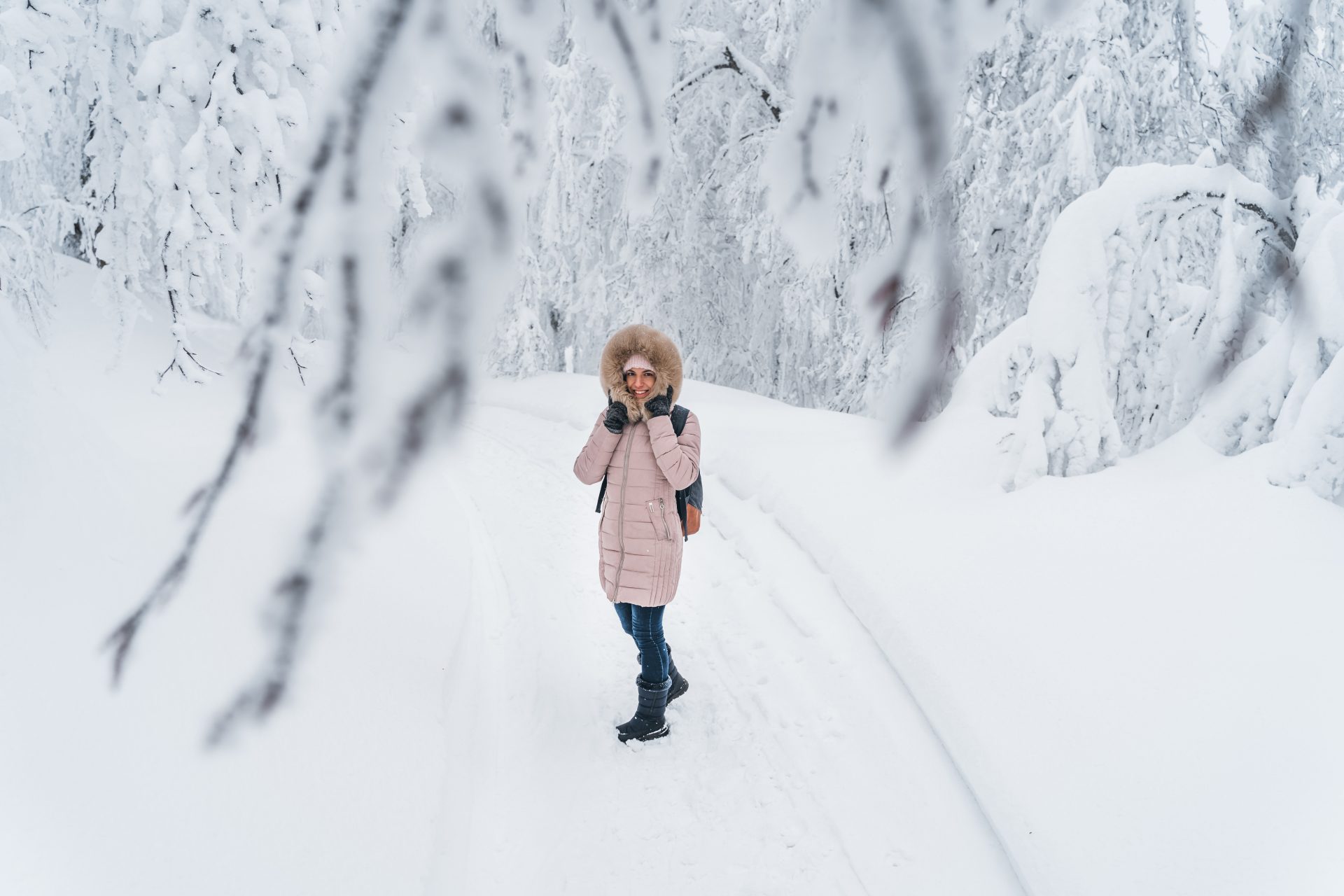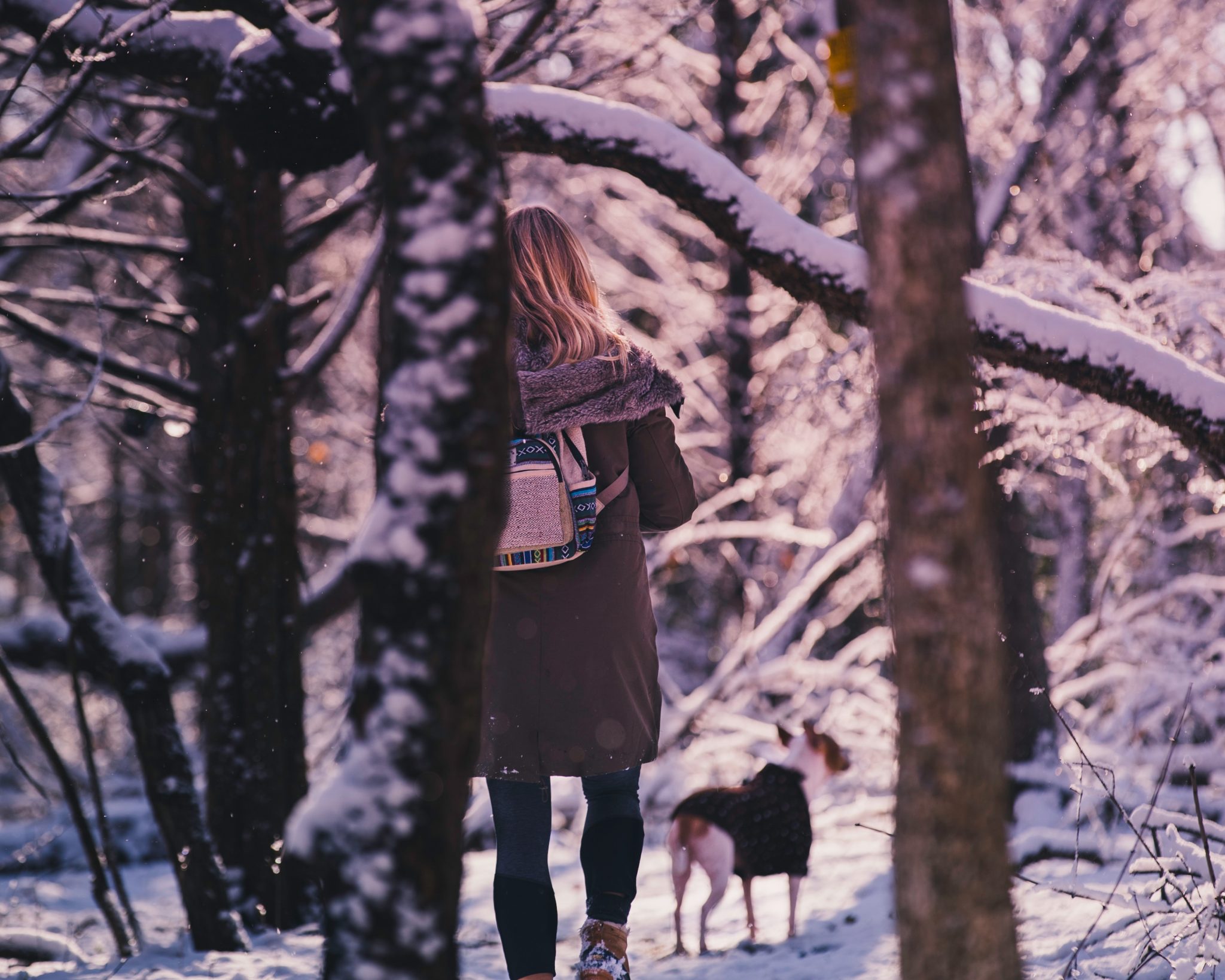The Scandinavian guide to surviving the dark days of winter

Written by Helen Russell
Helen Russell is a journalist and bestselling author. Formerly an (occasionally glossy) editor in London, Helen now lives in Denmark with her husband and three young children.
Seasonal affective disorder (SAD) is a type of depression that can be worse in winter. Journalist and happiness researcher Helen Russell has spent years studying winter resilience from her home in Denmark, where frozen nights stretch for 17 hours of darkness. Here, she shares the best advice she’s learned to get through it.
It gets dark in Denmark during the winter. Really dark. Really quickly. So fast in fact, that it can be tricky to tell what time of day it is without wearing a watch, especially while working from home as a freelancer.
During my first winter of living Danishly, I peered out into the thick, black nothingness after a hectic day at the happiness-coalface and estimated that it must be ‘evening’. So I poured myself a glass of wine and had just begun stirring up a carb-heavy, stodge-laden stew when my husband walked in.
“What are you doing?” he asked, incredulously.
“What do you think I’m doing?” I answered, also incredulously. “I’m making dinner.”
“It’s 4pm…?” He shot a glance at my (full) glass and wondered when daytime drinking had become a habit.
“Oh…” I put down the wooden spoon, kept the wine, and reached for a bag of crisps instead.
That first winter in Denmark, where we had relocated for my husband’s job, was so cold and dark that even our dog got Seasonal Affective Disorder. Yes, this is ‘a thing’, apparently. Researchers from the University of British Columbia found that 40% of dog owners saw a downturn in their pets’ moods during winter due to differing melatonin and serotonin levels.
And it turns out that Scandinavia holds the gold standard for SAD – cross species. A study from the Danish Ministry of Climate and Energy showed that there were only 44 hours of sunlight in Denmark in November. That’s just over 10 hours a week – less than an hour and a half a day. It’s essentially J R R Tolkien’s Mordor.
It’s so bad that many Danes suffer from ‘vinterdepression’, or winter depression, and the lack of daylight hours are the most significant explanation for seasonal variations in suicidal behaviour, according to Denmark’s Centre for Suicide Research. During the research for my first book, The Year Of Living Danishly, I called up to find out more about and learned that the general advice for anyone suffering from vinterdepression is to get some sun – either by going away somewhere hot or via ‘artificial means’.
As retro as it sounds, Danes still love a sunbed and a report in the British Medical Journal found Danes to be the most prolific users in the world. As the proud possessor of a practically blue Irish complexion and a practically empty bank account, sunbeds and sunny holidays were out. The third option suggested to me was a sunlight simulation lamp. So I hit the shops.
The makers of my new ‘light bath’ sunrise clock, ‘with additional nature sounds’, promised that it would improve my wellbeing, fight SAD and have me bounding with energy. What actually happened was that I was near-blinded by an enormous orb of iris-exploding luminosity six inches from my head at 6am.
Squinting, I’d reached out a hand to turn the damn thing off but accidentally turned on the ‘nature sounds’. My husband woke as if from a fever dream, shielded his eyes from the glare and yelped in panic: “Help! There are birds in our bedroom! They’re… everywhere!” I’d felt for buttons to kill the crazy birdsong but failed to get purchase and accidentally knocked the orb off its base. It landed on the Scandi-issue wooden floor with a ‘crack!’ and the birdsong faded to a sad tweet, never to sing again. It was officially the worst wake-up call I’d ever had.
I spent the next morning researching other recommended antidotes for Danish winters. Most of my friends tell me to light more candles (‘for the hygge!’) and eat more cake. This helps slightly but it doesn’t feel like an entirely sustainable solution. Many experts swear by Vitamin D, known as the ‘sunshine vitamin’. As Darshana Durup of the Department of Pharmacology and Pharmacotherapy at the University of Copenhagen tells me, up to 40% of the Danish population are thought to be Vitamin D deficient in winter.
The Ministry of Food, Agriculture and Fisheries in Denmark (everyone’s favourite ministry) recommend 10 ug/day of Vitamin D for optimum health, but the average Dane is getting approximately 3ug/day. The best source is the sun, but in Denmark there isn’t enough of that from October to March, so many Danes have to take Vitamin D in pill form.
Finland, Norway, Sweden and Iceland all report colder weather and fewer daylight hours in a typical winter than Denmark. So how do the other Nordic nations survive and keep on keeping on as some of the happiest people in the world? I go on a mission to find out, spending time in some (even) colder, darker places around the world in an attempt to find out what keeps people afloat to research my new book, The Atlas Of Happiness, uncovering the global secrets of how to be happy.
So what useful advice can I share for beating the ‘winter blues’? Marianne, a university friend from Finland who lives in Helsinki, tells me: “You basically need to hibernate. The best thing you can do is get enough sleep, and winter is the perfect time of year to spend the long evenings watching Netflix then going to bed at 9.30pm.” Understood. Think: Mole in Wind in the Willows.
My friend Birna from Reykjavik tells me that in Iceland, sunshine is such a rarity (even in summer) that workers get an ad hoc ‘sun holiday’ to savour an uncharacteristically sunny day or ‘an Icelandic heatwave’ of 18 degrees Celsius. “We grow up tough: we’re Vikings,” she says, when I ask how on earth she handles this. “It’s all about mind-set. We learn to be resilient and we go outside whatever the weather – because if we didn’t go outside whatever the weather, we wouldn’t go outside at all in winter.” Fair point.
Niki Brantmark of the blog My Scandinavian Home has lived in Sweden for the past 16 years but admits that she still finds the short, dark days challenging. “Every year I tell my Swedish husband, ‘this is the last winter I’m spending here!’ and every year, he says, ‘Oh no, this is just a particularly bad one…’”
So what’s his secret to staying upbeat while essentially living in a fridge? “Planning!” she tells me. Most of us are typically at work during daylight hours during the week, so Niki recommends fighting for that window seat or corner office.
“If you work at home, put seats next to the window to make the most of natural light,” she advises. Next you need to dress for it. “Stay warm and be prepared for the cold and rain and snow, even.” Then? “Make sure you get outside during daylight hours – think like a smoker and take five minute breaks outside, at least three times a day.”
Nevada Berg of the North Wild Kitchen blog in Norway agrees: “Keeping active and social as much as possible is key and you have to make yourself get out and about.”
She recommends filling up the diary: “Anything from meeting up for a cup of coffee, going to the theatre, and exercising.”
For Nevada, acceptance is also key. “Enjoy winter for what it is and what makes it so special – cosying up by the fire, and having warm, comforting meals. It can be easy to focus on the limitations when you begin to see the possibilities then it’s easier to embrace the shorter days.”
Now, I make sure I dress for the weather – remembering the old adage that there really is no such thing as bad weather, just the wrong clothes. I take coffee breaks outside. I take all of the Vitamin D supplements. I plan things I can look forward to with friends and make sure I stay sociable. I’ve hauled furniture to be closer to natural light at home and at work. And I’m sinking into winter a little more, this year – like a cosy, candle-lit bath.
Well, until 9.30pm, that is. Then, I’m off to bed. See you in spring…
This piece was originally published in October 2019
Helen Russell is the bestselling author of The Year Of Living Danishly. Her new book The Atlas Of Happiness – The Global Secrets Of How To Be Happy, is out now (Two Roads, £16.99)
Find out more about seasonal affective disorder and get support via the NHS
Images: Getty, Unsplash
Source: Read Full Article




